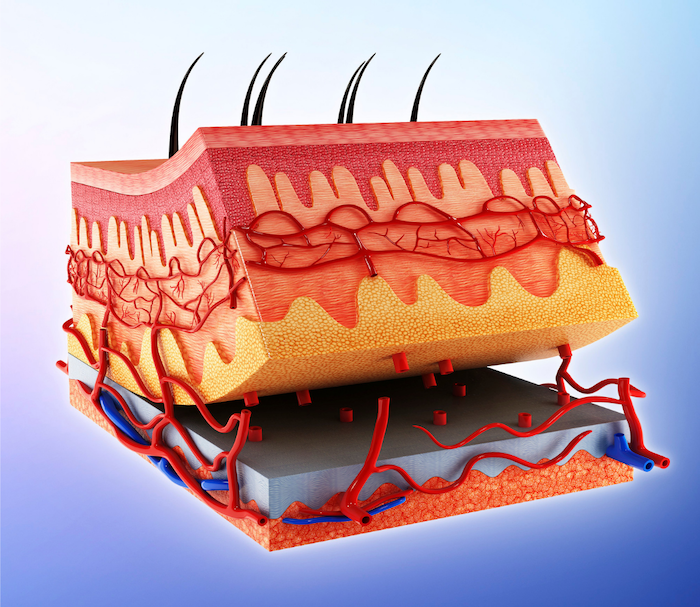The skin is the body’s largest organ, weighing in at about — on average — six to nine pounds.
It’s made up of several layers, including the epidermis, dermis, and subcutaneous layer. The skin protects the body from injury and infection and regulates body temperature. It also plays a role in immunity and communication. The skin can be affected by a variety of diseases and conditions, including acne, eczema, psoriasis, skin cancer, and others.
In today’s article, I want to break down the layers of the skin, the skin’s function, along with some other interesting details so that you can understand just how much is going on in this outer layer of your body!
Let’s jump right in…
The three layers of the skin are the epidermis, dermis, and subcutaneous layer.
The epidermis is the outermost layer and is made up of several layers of cells, including the stratum corneum, stratum basale, and stratum spinosum.
The stratum corneum is the outermost layer of the epidermis and consists of dead skin cells that are held together by a protein called keratin.
The stratum basale is the innermost layer of the epidermis and consists of cells that are constantly dividing and renewing the skin.
The stratum spinosum is the layer of the epidermis that contains the most cells.

The dermis is the middle layer of the skin and is made up of connective tissue. This is where the majority of the skin’s collagen is found. It contains blood vessels, hair follicles, and sweat glands.
The subcutaneous layer is the deepest layer of the skin. It is made up of fatty tissue and contains nerves, lymph nodes, and blood vessels.
The skin regulates body temperature by sweating and by vasodilation and vasoconstriction. Sweating is the process of releasing sweat from the sweat glands. Sweat is mainly water, but it also contains trace amounts of salt, proteins, and carbohydrates. It helps to regulate body temperature by evaporating and cooling the body.
Vasodilation is the widening of blood vessels. It increases blood flow and allows more heat to be released from the body.
On the contrary, vasoconstriction is the narrowing of blood vessels. It decreases blood flow and helps to retain heat in the body.
Being tough, elastic, and able to resist pressure and friction, the skin also protects the body from injury and infection. It contains immunocompetent cells that play a role in immunity. These cells help to protect the body from infection and disease.
The skin also contains melanocytes that produce melanin, which gives the skin its color. Melanin helps to protect the skin from damage by ultraviolet radiation from the sun.
The skin can be affected by a variety of diseases and conditions, including acne, eczema, psoriasis, skin cancer, and others.
Acne is a condition that affects the skin, characterized by blackheads, whiteheads, and pimples.
Eczema is a condition that causes the skin to become dry, itchy, and red.
Psoriasis is a condition that causes red, scaly patches on the skin.
Skin cancer is a disease that affects the skin and can be deadly if not treated. There are several types of skin cancer, including melanoma, basal cell carcinoma, and squamous cell carcinoma.
For these reasons, it’s crucial to protect the skin as much as possible, as it’s your first line of defense and is more vulnerable than you may think!
The skin is a vital organ that plays a number of important roles in the body.
It protects the body from injury and infection, regulates body temperature, and communicates with other organs in the body. The skin can be affected by a variety of diseases and conditions, but proper care can help to keep it healthy.
Collagen makes up 70-80% of the dry weight of your skin. [1]
This crucial protein gives your skin its mechanical and structural integrity.
As such, one of the best – and easiest – ways for you to protect your skin is to ensure you maintain healthy collagen levels.
But these levels naturally decrease with age.
A highly-absorbable collagen supplement like Complete Collagen+ can help.